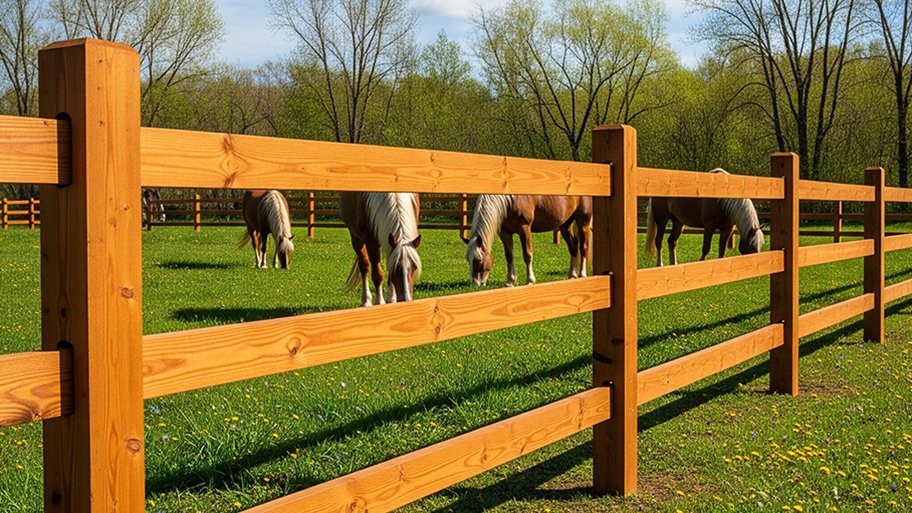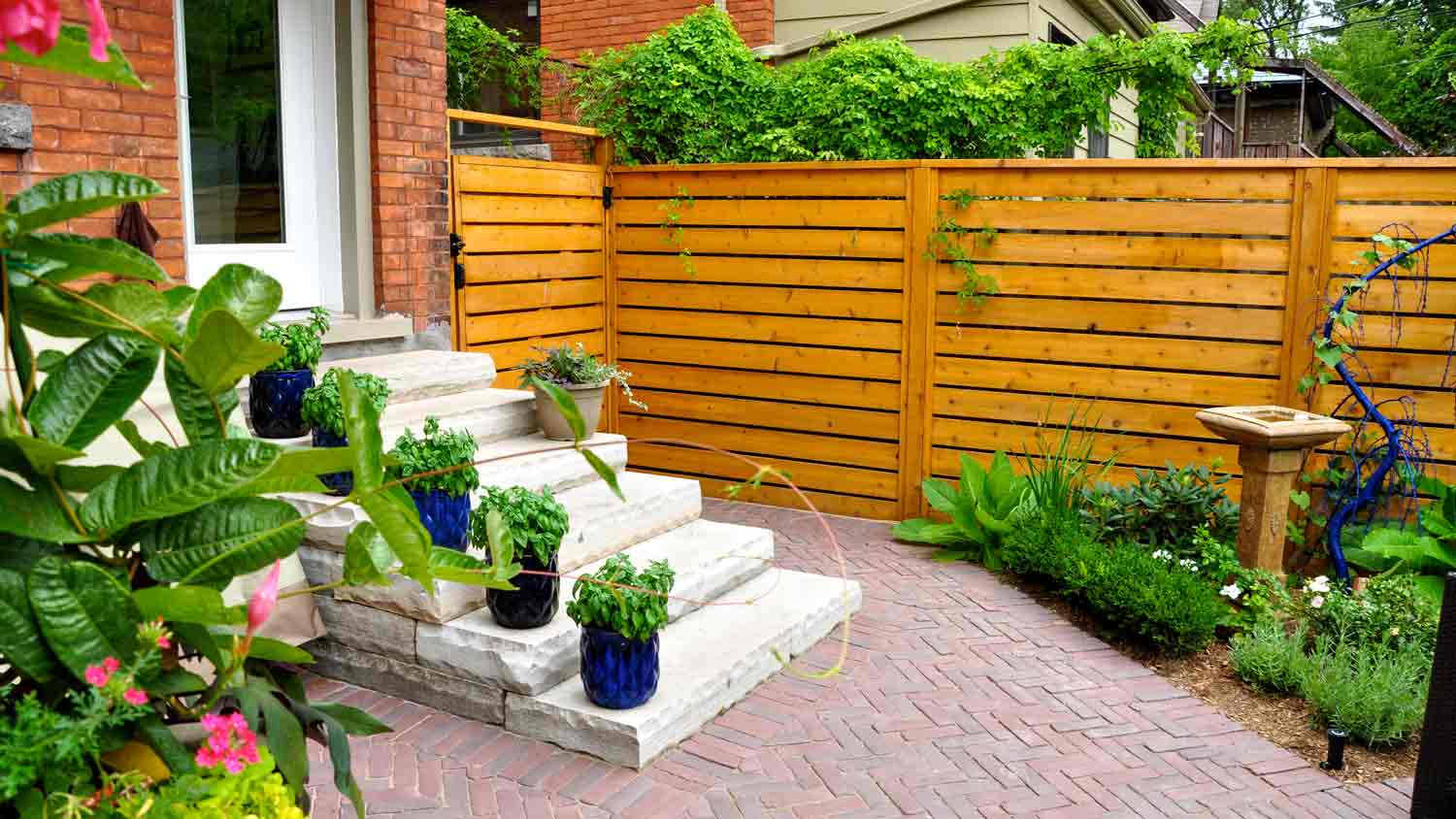
Explore the key factors that impact vinyl fence installation costs in Columbus, OH, including labor, materials, permits, layout, design, and yard conditions.
Fencing service costs depend on your project and location. Check with a local pro for your specific job.
Chain link is one of the most affordable fencing options, with prices as low as $8 per linear foot.
Choosing a fence with enhanced features might raise the price up to $40 per linear foot.
Factors affecting the cost of chain-link fences include height, gauge and thickness, number of posts, and more.
Smaller mesh sizes can increase the security of your fence, but they can also raise the cost by 50% to 100%.
Labor accounts for around 50% of the total cost.
Chain-link fence costs range from $1,298 to $3,575 for most homeowners, with an average of $2,406, including materials and labor. For a small 4-foot fence, you can pay as little as $530, but if you prefer a larger 8-foot fence, budget up to $6,100. You’ll likely spend between $8 and $40 per linear foot.
To help homeowners with their next project, Angi provides readers with the most accurate cost data and upholds strict editorial standards. We’ve surveyed thousands of real Angi customers about their project costs to develop the pricing data you see, so you can make the best decisions for you and your home. We pair this data with research from reputable sources, including the U.S. Bureau of Labor Statistics, academic journals, market studies, and interviews with industry experts—all to ensure our prices reflect real-world projects.
Chain-link fence installation costs $8 to $40 per linear foot, which includes materials and labor, with an average price range of $10 to $20 per linear foot. Contractors often issue estimates with a per-foot calculation, and costs increase as the fence height rises.
Here’s what you might pay based on chain-link fence height:
| Fence Height | Average Cost Range (per Linear Ft.) |
|---|---|
| 4 feet | $8–$20 |
| 5 feet | $9–$22 |
| 6 feet | $10–$29 |
| 8 feet | $12–$34 |
| 10 feet | $17–$40 |
The most affordable types of chain-link fences (galvanized and wood post) start at $5 per linear foot. On the other hand, the most expensive type (wrought iron) can reach prices up to $100 per linear foot.
Here’s how the type of chain link fence affects the cost:
| Type of Fence | Average Cost Range (per Linear Ft.) | Description |
|---|---|---|
| Galvanized chain link | $5–$8 | Withstands moisture and resists rust, which can extend the lifespan of your fence |
| Cyclone or hurricane fence | $8–$40 | Withstands high winds, water, and corrosion |
| Wood post chain-link Fence | $5–$45 | Combines strength of chain-link fencing with classic wooden look |
| Wrought iron post chain-link | $30–$100 | Protects against extreme weather; tailored aesthetic |
While the average cost is $2,406, many factors influence the price of a chain-link fence, including labor rates, gauge, mesh size, and more. Here’s what to expect.
Professional fence installation: 50% of the total cost (around $1,200, on average)
Gauge (thickness): $1.50–$7 per square foot for 11.5-gauge chain (thinner the metal strands); $2–$10 per square foot for 9-gauge chain (most common for residential fencing); $4–$20 per square foot for 6-gauge chain (best for heavy commercial use)
Mesh size: 2–3 times more expensive for a decreased mesh size, which has advanced security and durability
Diamond size: $3–$8 per linear foot for standard 2”x2” opening size between each link; $8–$15 per linear foot for 1”x1” diamond size
Posts: $3 per linear foot ($30 per post)
Permits: $20–$60
Land surveying: $1,000–$3,200
Gates: $100–$450 for a standard residential swing gate; $500–$1,800 for an automated rolling gate
Coating: $6–$8 per linear foot extra for powder coating; $10–$30 per linear foot for colored vinyl
Privacy slats: $3–$10 per linear foot
Faux ivy: $0.50–$1 per linear foot
Privacy screens: $3 per linear foot.
Removal of old chain-link fencing: $3–$5 per linear foot
Land leveling: $900–$3,000
Land clearing: $250–$2,800 per half-acre
Chain-link fence repairs: $300–$800
Professional fence installers charge between $25 and $50 per hour, depending on experience, and this job takes anywhere from 24 to 72 hours. Installing a chain-link fence yourself costs $500 to $1,000, or around half the cost of hiring a pro, but there are advantages and disadvantages to consider.
When installing a chain-link fence, consider hiring a fence installation pro near you for the following situations:
You need to install gates or tension wire properly.
You want a clean, professional finish with evenly stretched mesh.
The ground is hard, sloped, rocky, or requires concrete post footings.
You’re unsure how to handle corner posts or end post bracing.
You want to ensure long-term tension and stability.
You need the fence to meet code, HOA requirements, or property line regulations.
You might DIY chain-link fence installation in the following situations:
You’re willing to spend at least 25 hours on the project.
You have the time and the proper equipment (or you can obtain it).
The fence line is relatively short and straight, and the ground is level.
You're familiar with basic fencing hardware.
You’re installing a fence for utility or function, not curb appeal.
In the end, fence contractors charge $25 to $50 per hour, but they are experienced enough to finish the job quickly and overcome any obstacles.
Here are some simple tips to consider when installing everything from chain-link to vinyl fencing.
Mix up the height: To save money, consider a lower height or mix and match the height to suit different parts of your property. For example, a 4-foot fence costs $8 to $20 per linear foot, while a 10-foot fence costs $17 to $40 per linear foot.
Skip the concrete: If your soil is suitable, save labor costs ($25 to $50 per hour) by pounding the posts directly into the ground. This is only applicable to certain types of soil, however, so consult an expert beforehand.
Limit corners: Each corner requires a post and associated hardware, so go with a design that limits corners as much as possible.
Do some of it yourself: Removing old fencing ($3–$5 per linear foot) and adding privacy slats ($3–$10 per linear foot) are easy tasks to accomplish on your own, and they can save you a few hundred dollars.
Go in with neighbors: If you live in a close-knit community, reach out to your immediate next-door neighbor about splitting the cost of a chain-link fence for the portion that sits between both of your homes.
The average labor cost for installing a chain-link fence is $1,200.
Many homeowners hire a fencing pro to ensure proper tensioning, secure gates, and code-compliant results, especially on uneven terrain.
You can save by choosing a lower height and cost-effective materials, such as wood posts instead of wrought iron.
You might also DIY certain tasks, such as removing your old fence and adding privacy slats.
From average costs to expert advice, get all the answers you need to get your job done.

Explore the key factors that impact vinyl fence installation costs in Columbus, OH, including labor, materials, permits, layout, design, and yard conditions.

Looking for that rustic charm only a split rail fence can provide? Use this split rail fence cost guide to get an idea of what your fence will total.

Get a clear estimate of wood fence repair costs. Learn what impacts price, compare repair types, and find tips to save on your next fence project.

If you’re considering adding a wire fence to your property, you have choices. Keep reading for a breakdown of 10 types of wire fences.

Discover gate hinge types for every need—T hinges, barrel hinges, butt hinges, and more—and learn how to choose the best hinge for your project.

Moisture is often to blame for warped fence panels—but there are other causes, too. Learn about the most common ones (and how to fix them) in this guide.